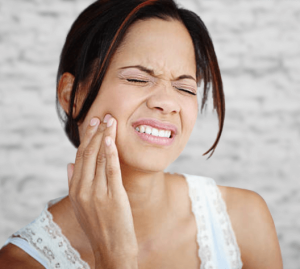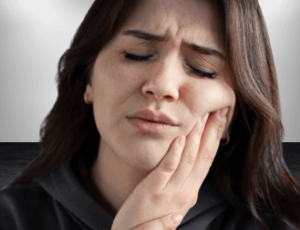You may not expect it, but jaw pain is a common experience that many new mothers face. After the birth of your baby, your body goes through a multitude of changes, and one of them might be discomfort in your jaw. This unexpected symptom can be attributed to a variety of factors, such as hormonal changes, stress, or even unintentional teeth grinding. In this article, we will explore the causes of postpartum jaw pain and provide some useful tips to help alleviate it, allowing you to fully enjoy this precious time with your little one.
Overview of Postpartum Jaw Pain
Postpartum jaw pain refers to the discomfort or pain experienced in the jaw area by women after giving birth. It is a common condition that can occur due to various reasons and can severely impact the overall well-being of new mothers. Understanding the causes, symptoms, diagnosis, treatment options, and potential complications of jaw pain is crucial for effective management and prevention of this condition.
Definition
Is characterized by pain, soreness, or discomfort in the jaw joint or surrounding muscles. It can range from mild to severe and may affect one or both sides of the jaw. The pain may be constant or intermittent, and it can worsen while chewing, talking, or yawning. It is often accompanied by other symptoms such as headaches, neck pain, and earaches.
Prevalence of Postpartum Jaw Pain
The prevalence of jaw pain varies, but it is estimated that a significant number of new mothers experience this condition to some degree. While exact statistics are not available, studies suggest that hormonal changes, stress, dental issues, and breastfeeding can contribute to the development of jaw pain after childbirth. It is important to note that the prevalence may differ among individuals due to various factors such as genetics, overall health, and lifestyle.
Causes of Postpartum Jaw Pain
One common cause is hormonal fluctuations that occur during and after pregnancy. The sudden drop in estrogen and progesterone levels can affect the muscles and joints in the jaw, leading to pain and discomfort. Additionally, stress levels tend to be high during the postpartum period, which can contribute to muscle tension and exacerbate jaw pain.
Another contributing factor is the physical strain experienced during childbirth. The muscles in the jaw and face may become tense and fatigued due to prolonged pushing or dental interventions, leading to pain. Dental problems, such as teeth clenching or grinding, can also contribute to jaw pain.
>> Read more: How to manage lower stomach pain
Signs and Symptoms
It is commonly described as a dull ache or soreness in the jaw joint or surrounding muscles. The intensity and duration of the pain may vary from person to person. In addition to jaw pain, other symptoms that may accompany this condition include headaches, neck pain, earaches, and difficulty opening or closing the mouth. Some women also report clicking or popping sounds in the jaw joint while eating or speaking.
It is important to pay attention to these signs and symptoms and seek medical attention if the pain is severe, persistent, or significantly affecting daily activities.
>>
How to Relieve Jaw Pain During Pregnancy
Here are some tips to relieve jaw pain during pregnancy:
- Apply heat or ice: Applying a warm or cold compress to the affected area can help reduce inflammation and ease pain. A warm compress can help relax the muscles, while a cold compress can numb the area and reduce swelling.
- Practice relaxation techniques: Stress can cause tension in the jaw muscles, leading to pain and discomfort. Relaxation techniques such as deep breathing, meditation, and yoga can help reduce stress and tension in the body.
- Massage the jaw muscles: Gently massaging the jaw muscles can help relieve tension and pain. Use your fingertips to massage the muscles in circular motions, moving from the jawline to the temples.
- Practice good posture: Poor posture can cause tension in the neck and shoulder muscles, which can contribute to jaw pain. Make sure to sit and stand up straight, keeping your shoulders relaxed and your chin parallel to the ground.
- Avoid chewing gum: Chewing gum can cause overuse of the jaw muscles, leading to pain and discomfort. Try to avoid chewing gum, or limit it to a few minutes at a time.
Jaw Pain Early Pregnancy Symptom
According to Healthline, some women may experience implantation bleeding, which can be mistaken for a light period. Other early pregnancy symptoms include fatigue, nausea, and breast tenderness.

The hormonal changes that occur during early pregnancy can cause some women to experience jaw pain. Estrogen and relaxin hormones rise in pregnancy, which increases the laxity of all the joints in the body to help in childbirth. However, it might lead to joint stretching and pain, including in the temporomandibular joints.
If a woman is experiencing jaw pain during early pregnancy, she may want to try applying an ice pack or moist heat to the affected area, whichever one helps relieve it. Performing gentle massage on the neck, jaw, and facial muscles with a soft cloth or her own hands may also be helpful. A full upper body massage may be beneficial as well.
>> Read more: Why You should try a postpartum soup recipe
Jaw Pain During Pregnancy First Trimester
The first trimester is a crucial time for the development of the baby, and the mother’s body undergoes significant changes to support the growing fetus. These changes can also lead to jaw pain and discomfort.
One of the primary causes of jaw pain during the first trimester is hormonal changes. The levels of estrogen and relaxing hormones rise in pregnancy, which increases the laxity of all the joints in the body to help in childbirth. However, it might lead to joint stretching and pain, including in the temporomandibular joints (TMJ) that connect the jawbone to the skull.

Another possible cause of jaw pain during pregnancy is stress and tension. Pregnancy can be a stressful time, and the body may respond to this stress by tensing up the muscles, including those in the jaw. This tension can cause pain and discomfort, particularly in the TMJ.
Lack of calcium in one’s diet can also be a contributing factor to jaw pain during pregnancy. Calcium is essential for the development of the baby’s bones and teeth, and the mother’s body may draw from her calcium stores to support the growing fetus. This can lead to a deficiency in calcium, which can cause muscle spasms and pain, including in the jaw.
In some cases, more severe jaw pain during pregnancy may require medical attention. If the pain is accompanied by swelling or difficulty opening and closing the mouth, it is essential to consult a healthcare provider.
Jaw Pain Pregnancy Second Trimester
During the second trimester of pregnancy, hormonal changes can cause jaw pain in some women. Swelling and stress with hormonal alterations can worsen jaw pain in pregnant women. According to MomJunction, pregnancy-induced jaw pain and dental pain can be due to hormonal changes.
If jaw pain emerges early in pregnancy, then the second trimester is the safest time to get dental procedures done along with antibiotic treatment if necessary. However, it’s essential to consult with a healthcare provider before undergoing any dental procedures.
In addition to hormonal changes, stress, and tension can also cause jaw pain during pregnancy. Women may clench their teeth or grind them together due to stress or anxiety, leading to jaw pain. It’s important to manage stress levels during pregnancy to avoid jaw pain.
>> Read more: Why do I hear water sloshing around my stomach
Jaw Pain Pregnancy Third Trimester
During the third trimester of pregnancy, many women may experience jaw pain due to various reasons. One of the main reasons is hormonal changes. As estrogen and relaxin hormones rise in pregnancy, they increase the laxity of all the joints in the body to help in childbirth. However, this can lead to joint stretching and pain, including in the temporomandibular joints (TMJ) (MomJunction).

Another reason for jaw pain during the third trimester is the physical strain that pregnancy puts on the body. The weight of the growing baby can cause strain on the neck, back, and jaw muscles, leading to pain and discomfort. In addition, the pressure of the baby’s head on the pelvis can cause misalignment of the spine, which can also contribute to jaw pain (Johnston Health Center).
To alleviate jaw pain during the third trimester, there are a few things that pregnant women can do. Applying an ice pack or moist heat to the affected area, whichever one helps relieve it, can help reduce inflammation and pain. Performing gentle massage on the neck, jaw, and facial muscles with a soft cloth or your own hands can also be helpful. A full upper body massage may also be beneficial.
Left Side Jaw Pain Pregnancy
If a pregnant woman experiences left-side jaw pain, it may be due to temporomandibular joint (TMJ) disorder. The TMJ is a hinge joint that connects the jawbone to the skull. It is responsible for the movement of the jaw, allowing us to chew, talk, and yawn. During pregnancy, the hormones relaxin and progesterone can cause the ligaments and muscles around the TMJ to become loose, leading to pain and discomfort.
The left-side jaw pain during pregnancy can also be caused by stress. Pregnant women are often under a lot of stress, which can cause them to clench their jaw or grind their teeth, leading to TMJ pain. Poor posture can also contribute to left-side jaw pain during pregnancy. Pregnant women often have a protruding belly, which can cause them to slouch, putting pressure on the jaw and leading to pain and discomfort.
To alleviate left-side jaw pain during pregnancy, pregnant women can try the following:
- Practice good posture: Sit up straight and avoid slouching to reduce pressure on the jaw.
- Apply heat or cold: Apply a warm or cold compress to the affected area to reduce pain and inflammation.
- Massage: Gently massage the jaw muscles to reduce tension and alleviate pain.
- Avoid hard or chewy foods: Stick to soft foods that are easy to chew to reduce strain on the jaw.
- Practice relaxation techniques: Practice deep breathing, meditation, or yoga to reduce stress and tension in the body.
If left-side jaw pain during pregnancy is severe or persistent, pregnant women should consult their healthcare provider. They may recommend physical therapy, medication, or other treatments to alleviate the pain and discomfort.
Right Side Jaw Pain Pregnancy
During pregnancy, hormonal changes can cause the muscles and ligaments in the jaw to relax, making it easier to grind teeth. Stress and tension can also contribute to bruxism, which can lead to jaw pain. In addition, the weight gain and changes in posture that occur during pregnancy can put extra pressure on the jaw, exacerbating any existing pain or discomfort.
There are a few things you can do to help alleviate your symptoms:
- Practice good oral hygiene to reduce the risk of tooth decay and gum disease, which can contribute to jaw pain.
- Use a warm compress or ice pack to help reduce inflammation and relieve pain.
- Practice stress-reducing activities, such as yoga or meditation, to help manage stress and tension.
- Avoid hard or chewy foods that can exacerbate jaw pain.
- Consider wearing a mouthguard at night to help prevent teeth grinding.
When to Seek Medical Attention
While jaw pain is a common phenomenon, it is essential to seek medical attention if the pain is severe, does not improve with self-care measures, or is accompanied by other concerning symptoms. Medical evaluation is particularly warranted if you experience difficulty eating or talking, facial swelling, or if the pain interferes with breastfeeding or bonding with your baby.
Diagnosis of Postpartum Jaw Pain
Diagnosing postpartum postpartum jaw pain typically involves a medical history evaluation, physical examination, and possibly diagnostic tests. During the medical history evaluation, your healthcare provider will inquire about your symptoms, medical history, and any recent dental interventions.
A physical examination will involve palpating the jaw joint and surrounding muscles to evaluate the presence of tenderness or swelling. Your healthcare provider may also assess your jaw mobility, listen for joint clicking or popping sounds, and examine your teeth and bite alignment.
In some cases, diagnostic tests such as X-rays or magnetic resonance imaging (MRI) may be ordered to further evaluate the jaw joint and rule out other potential causes of your symptoms. These tests can provide detailed images of the jaw joint, helping to identify any structural abnormalities or signs of inflammation.
Treatment Options
The treatment of postpartum jaw pain involves a comprehensive approach that focuses on alleviating pain, reducing inflammation, promoting healing, and addressing the underlying causes. The following treatment options are commonly considered:
Conservative management:
In many cases, conservative measures can effectively manage postpartum jaw pain. These may include practicing good oral hygiene, using warm or cold compresses on the affected area, avoiding hard or chewy foods, and practicing relaxation techniques to reduce muscle tension.
Medications for pain relief:
Over-the-counter pain medications, such as acetaminophen or nonsteroidal anti-inflammatory drugs (NSAIDs), may be recommended to relieve pain and reduce inflammation. These should be used under the guidance of a healthcare provider, especially if you are breastfeeding.
Physical therapy and exercises:
Physical therapy techniques, such as jaw exercises and stretches, can help improve jaw mobility, strengthen the muscles, and reduce pain. A physical therapist can guide you through these exercises and provide techniques to manage muscle tension and promote relaxation.
Alternative therapies:
Some individuals find relief from jaw pain through alternative therapies such as acupuncture, chiropractic care, or massage therapy. These modalities can help alleviate muscle tension, reduce pain, and promote overall well-being. It is important to consult with a healthcare provider before pursuing alternative therapies to ensure their safety and effectiveness.
Complications and Long-Term Effects
If left untreated, jaw pain can potentially lead to complications or long-term effects. Chronic jaw pain can significantly impact daily activities, including eating, talking, and caring for your baby. It may also affect your ability to breastfeed comfortably, potentially leading to difficulties in establishing a strong bond with your baby. Additionally, untreated jaw pain can contribute to increased levels of stress and negatively impact your overall mental and emotional well-being.
Potential complications of untreated postpartum jaw pain
If not addressed, postpartum jaw pain can cause chronic muscle tension, leading to temporomandibular joint disorder (TMJD) or other jaw-related issues. TMJD is a condition that affects the jaw joint and the muscles surrounding it, causing pain, difficulty in using the jaw, and even headaches and neck pain.
Impact on breastfeeding and bonding with the baby
Jaw pain can significantly affect a mother’s ability to breastfeed comfortably. The pain and discomfort while nursing can make the experience unpleasant and may negatively impact milk supply and breastfeeding success. Additionally, the pain can interfere with the mother’s ability to bond with her baby and may cause frustration or stress for both the mother and the baby.
Prevention of Postpartum Jaw Pain
While it may not be possible to prevent all cases of postpartum jaw pain, there are several steps you can take to minimize the risk:
Tips:
- Practice good posture during pregnancy and postpartum, as keeping the spine aligned can reduce strain on the jaw muscles.
- Avoid excessive teeth clenching or grinding, especially during times of stress. If you notice any signs of teeth grinding, such as worn-down teeth or jaw soreness, consult with a dentist for guidance.
- Manage stress levels through relaxation techniques, such as deep breathing exercises, meditation, or gentle yoga. Seek support from loved ones, healthcare professionals, or support groups to help cope with the challenges of new motherhood.
- Maintain a balanced diet rich in essential nutrients to support dental and overall health. Avoid hard or chewy foods that may strain the jaw joint.
- Practice good oral hygiene, including regular brushing and flossing, to maintain dental health and minimize the risk of dental problems that can contribute to jaw pain.
Importance of proper postnatal care:
Seeking regular postnatal care from healthcare professionals is crucial in managing and preventing postpartum jaw pain. Your healthcare provider can monitor your overall health, assess any risk factors, and address concerns promptly. Regular dental check-ups are also important during the postpartum period to ensure optimal oral health and address any dental issues that may contribute to jaw pain.
Postpartum Jaw Pain and Hormonal Changes
Hormonal fluctuations play a significant role in jaw pain. During pregnancy, estrogen and progesterone levels rise, contributing to changes in the muscles, ligaments, and joints throughout the body. After childbirth, these hormone levels rapidly decline, potentially leading to muscle tension, inflammation, and pain in the jaw area.
Link between hormonal fluctuations and jaw pain
Estrogen and progesterone influence the production of collagen, a protein that provides strength and support to various tissues, including those in the jaw joint. Fluctuations in these hormones can affect the collagen production, leading to the weakening or stretching of the ligaments that support the jaw joint. This can cause instability of the joint, resulting in pain and discomfort.
Role of estrogen and progesterone
Estrogen and progesterone also influence the pain perception threshold and can contribute to heightened sensitivity to pain. These hormones affect the central nervous system, including areas involved in pain processing, potentially amplifying the perception of jaw pain.
Effect of breastfeeding on hormonal levels
Breastfeeding stimulates the production of the hormone oxytocin, which can affect the release of estrogen and progesterone. While research on the specific impact of breastfeeding on postpartum jaw pain is limited, some women may experience hormonal changes associated with breastfeeding that can influence their symptom severity or duration. It is important to note that individual experiences may vary, and it is always recommended to consult with a healthcare provider for personalized guidance.
Postpartum Jaw Pain and Dental Health
The relationship between dental problems and jaw pain is well-established. During pregnancy, hormonal changes and increased blood circulation can affect oral health, potentially leading to dental issues. Poor dental health, such as tooth decay, gum disease, or misalignment of the teeth or jaw, can contribute to jaw pain and discomfort.
Effects of pregnancy on dental health
Pregnancy can increase the risk of developing dental problems due to hormonal changes and other factors. Pregnant women may experience a condition called pregnancy gingivitis, characterized by inflamed and bleeding gums. Hormones can also affect saliva production, leading to dry mouth, which can contribute to tooth decay and gum disease. Additionally, cravings for sugary foods during pregnancy can further increase the risk of dental problems.
Importance of dental hygiene during pregnancy
Maintaining good dental hygiene during pregnancy is essential for preventing dental issues that may contribute to jaw pain. Regular brushing and flossing, along with routine dental check-ups and cleanings, can help prevent tooth decay, gum disease, and other oral health problems. It is important to inform your dentist about your pregnancy and discuss any concerns or symptoms you may have to receive appropriate care.
Postpartum Jaw Pain and Stress
Stress can have a significant impact on jaw pain. The postpartum period can be overwhelming and emotionally challenging for new mothers. Stress can lead to increased muscle tension, including the muscles in the jaw, exacerbating jaw pain and discomfort.
Impact of stress on haw pain
When faced with stress, the body responds by activating the “fight-or-flight” response. This response triggers the release of stress hormones, such as cortisol, which can cause muscle tension and tightness. In the context of postpartum jaw pain, stress-related muscle tension can worsen existing symptoms, leading to increased pain and discomfort.
Coping mechanisms for stress management
Effective stress management techniques can significantly help in alleviating jaw pain. Engaging in activities such as deep breathing exercises, meditation, gentle exercises like yoga or walking, and finding time for relaxation can help reduce stress levels and promote overall well-being. Seeking support from loved ones, joining support groups, or consulting with a mental health professional can also provide valuable strategies for managing stress during the postpartum period.
Support and Resources
Seeking support and accessing relevant resources is essential for managing postpartum jaw pain. Several healthcare providers and resources are available to help individuals navigate this condition effectively.
Professional healthcare providers:
Consulting with healthcare professionals is crucial in diagnosing and managing postpartum jaw pain. Your primary care physician, obstetrician-gynecologist, or a dentist with experience in managing jaw pain can provide guidance, recommend appropriate treatments, and refer you to specialists if needed.
Support groups and online communities:
Connecting with other women who have experienced or are currently dealing with postpartum jaw pain can provide valuable support, empathy, and information. Online support groups and communities focused on postpartum health or jaw pain can be accessed from the comfort of your home and can help you connect with individuals who understand your experiences.
Educational resources:
Educational resources, such as articles, books, and websites dedicated to postpartum health or jaw pain, can provide valuable information on prevention, self-care measures, treatment options, and coping strategies. Consult reputable sources to ensure accurate and reliable information.
In conclusion, postpartum jaw pain is a common condition experienced by many new mothers. Understanding the causes, symptoms, diagnosis, treatment options, and potential complications of this condition is essential for effective management and prevention. By seeking medical attention, practicing good oral hygiene, managing stress levels, and accessing support and resources, you can effectively address postpartum jaw pain and ensure a comfortable and enjoyable postpartum experience.
